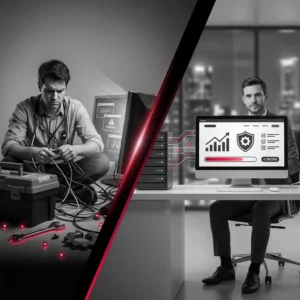WordPress websites have gained huge popularity due to their ease of use and flexibility. With countless themes, plugins, and customisation options, building a stunning and feature-rich business website has never been easier. However, this simplicity comes with responsibility.
1: Neglecting Regular Updates
WordPress releases regular updates for its core software, themes, and plugins. These updates often include crucial security patches, bug fixes, and feature enhancements. Neglecting to install these updates can expose your website to security vulnerabilities and compatibility issues.
Think of it as leaving your front door unlocked or your car without regular oil changes. You wouldn’t want intruders or unexpected breakdowns, would you? So, make it a habit to update your WordPress website promptly to keep it secure and running smoothly.
2: Installing Too Many Plugins
WordPress offers a vast array of over 60,000 plugins, allowing you to extend your website’s functionality with just a few clicks. It’s tempting to install multiple plugins for every feature you desire. However, excessive plugin usage can be detrimental to your website’s performance. Each plugin adds additional code, which can slow down your site and lead to conflicts between plugins. In addition, not all plugins are well-maintained or secure, making your website more susceptible to hackers. Also the more plugins your site runs, the more options an attacker has to find a way in.
Choose your plugins wisely, keeping only the essential ones and regularly evaluate and remove unnecessary ones.
3: Using Weak Passwords
It’s astonishing how many WordPress website owners still use weak passwords that are easily guessable or crackable. Your password is the first line of defense against unauthorized access to your admin account. Using common words, personal information, or simple combinations makes it effortless for malicious individuals to gain control over your website. It’s like hiding the key to your house under the welcome mat! Ensure you create strong, unique passwords using a combination of uppercase and lowercase letters, numbers, and special characters. Use a password management tool to use unique passwords for added convenience and security.
4: Ignoring Website Backups
Imagine waking up one day to find your WordPress website hacked or encountering a catastrophic error that wipes out your valuable data. Without regular backups, you risk losing all your hard work and critical content and eroding customer trust.
Schedule regular backups for your WordPress website, ensuring that both the database and files are included. Store backups in secure off-site locations or use reputable backup services to prevent data loss and simplify the restoration process.
5: Disregarding Security Measures
WordPress provides various security measures and best practices to safeguard your website. However, many website owners overlook these crucial aspects, leaving their sites exposed to potential threats. Neglecting security is like leaving your valuables unattended in a public place. – you are just asking for trouble…
Implement security measures such as using SSL certificates, enabling two-factor authentication, limiting login attempts and utilising security plugins. Regularly scan your website for malware and vulnerabilities, and promptly address any security issues that come up.
Looking for expert help?
Breaking a WordPress website is easier than you might think, but with a little caution and preventive measures, you can maintain the integrity of your online business presence. Neglecting regular updates, installing excessive plugins, using weak passwords, not having backups, and ignoring security measures can lead to disastrous consequences. By staying vigilant and following the best practices mentioned, you can ensure the smooth functioning and security of your WordPress website.
If you are worried about the risks or time needed to properly look after your business website, we offer website Care Plans that take care of everything. Join the dozens of other business owners that enjoy peace of mind from £30
FAQs
- How often should I update my WordPress website? It is recommended to update your WordPress website as soon as updates become available. Regularly check for updates and install them promptly to ensure security and compatibility.
- Is it safe to use free plugins for my WordPress site? Free plugins can be safe and useful, but exercise caution. Choose plugins only from reputable sources, check user reviews, and verify compatibility and support before installation.
- What are some best practices for creating strong passwords? Create strong passwords by combining uppercase and lowercase letters, numbers, and special characters. Avoid using common words, personal information, or simple combinations. Consider using a password management tool for added convenience and security.
- How frequently should I perform backups for my WordPress site? Regular backups are crucial for safeguarding your WordPress site. Depending on the frequency of updates and content changes, perform backups at least weekly or ideally daily. Store backups securely off-site or use reliable backup services.
- Are there any recommended security plugins for WordPress? Yes, several security plugins can enhance the security of your WordPress website. Some popular options include iThemes Security, Wordfence and Sucuri Security. Research and choose a plugin that suits your specific needs and requirements.
- Can I get help with all of this? Of course, as a Care Plan customer, we’ll handle all this and much more for an affordable monthly fee.







